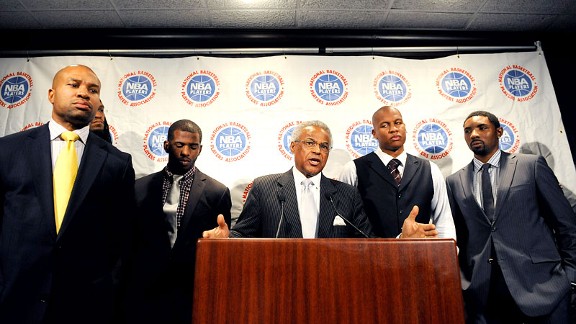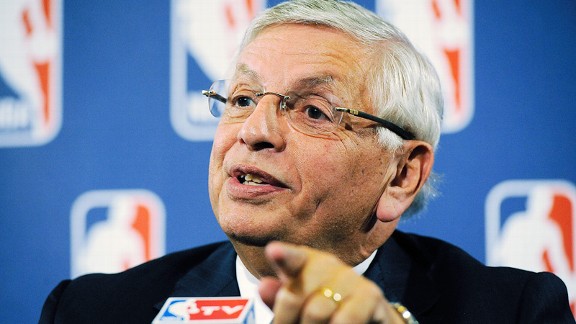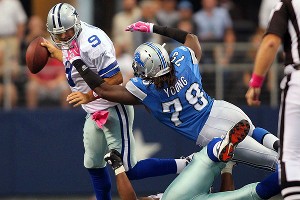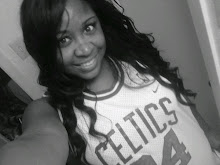 Patrick McDermott/Getty ImagesClues to the negotiations' next steps from Billy Hunter's Thursday speech.
Patrick McDermott/Getty ImagesClues to the negotiations' next steps from Billy Hunter's Thursday speech.Leaders of the NBA and the Players Association are back at it once more, less than a week after the best efforts of one of the world's most respected mediators failed spectacularly.
The issue dividing them was real: Owners are unwilling to give players more than 50 percent of basketball-related income (BRI) -- a number that already makes many in Stern's camp queasy. Meanwhile, the players have found a certain kind of religion around the idea of 53 percent of BRI.
NBPA executive director Billy Hunter described the process of Thursday's ill-fated talks in some detail, and the crux of things was the league's unwillingness to go one penny above 50.
After chastising the players for having "blood issues" in these talks, the owners have found theirs, and it's 50 percent of BRI. Hunter says that the league told him on Thursday that if the players were unwilling to accept that number, there was no point in talking further.
"They said if we're going to meet, you've got to agree to accept 50-50," Hunter said Thursday. "As long as that edict is out there, then when are we going to meet?"
Hunter says that when the league laid down the "take it or leave it" offer, he was incredulous, shocked. "I said are you serious? And they said 'yeah, we're serious.'"
Assuming the league's firm stance on 50-or-bust has not changed -- league sources indicate it is as firm as ever -- what point could there possibly be to today's meeting?
There are clues in Hunter's words from Thursday.
An opening
No one who was in the room when Hunter spoke last Thursday would accuse him of being weak. He was boisterous and loud. (In my recording of the press conference, Derek Fisher is nearly inaudible. Hunter, however, is clear as a bell.)
But through all that tough talk, it's worth noting what Hunter did not say. He never said that the players wouldn't accept the owners 50/50 offer.
What he said was that they'd never accept it ... while all those other issues were hanging around that could make things even worse for players. They would not accept 50/50 yet, in other words. But with some wins on the other issues ... Hunter hints 50 percent is within the realm of possibility.
"We're at 53," Hunter said. "You're at 50. Maybe if we try to address the system, and some of those issues, maybe we can come back and look and maybe it will be more palatable to us after we have talked about the system."
Speaking of the league, Hunter says: "We didn't ask them to move off of their number [of 50]. We didn't ask them to come up. We said let's go and talk about all these other issues. Let's go and talk about all these other things. The system is maybe even more important to the players than the dollars, if the system is right."
Saying the other issues are more important is a strong sign that the players' 53 is negotiable. Also worth noting: The players have already made an offer that is lower than 53. In fact, they have made an offer that they say would pay players just 50 percent of BRI in a slow economy. But if NBA revenues climb, so would the players' share of BRI, to a maximum of 53.
In short, that means the players have already offered something that sounds a lot like 50, which is another strong sign Hunter's union is not that far from 50. He also said the key issue was getting his players to come along: "You're at 50. In order to sell it to our membership, let's let it float. Let's let the economy and the revenue generation year in and year out determine what the number will be. It can be 50, 51, 52, or it can go as high as 53. But it couldn't go any lower than 50."
On today's agenda
Assuming the owners are as entrenched as ever at 50, what is there to talk about today? The system -- which is really a bundle of issues that determine exactly how hard the NBA's salary cap will be, and, related, how certain NBA players' incomes will be.
Hunter's core concerns: "We're not prepared to let them impose a system on us that eliminates guarantees, reduces contract lengths, diminishes annual contract increases, eliminates the other [salary cap] exceptions, really restricts Bird [rights for teams to exceed the cap to re-sign their own free agents]. That's the kind of system they want. And we say no way. We have fought too long, and made too many sacrifices, to get where we are. We're talking about a system that's going to generate billions of dollars in the next few years and we were prepared to take a step back, to take a cut, to help them. We have presented them with a proposal that would address all of their losses, so that minimally they would have broken even. So that's where we are."
Where they are is once again in a New York City hotel room, with something to talk about.







